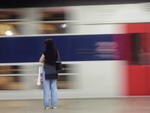Why Am I Anxious?
There are four types of anxiety, as far as I am concerned. You may be surprised to learn that I don't find it very helpful to group types of anxiety together by their symptoms. It's much more worthwhile to categorise them by their cause. Why? Because you don't solve something by dealing with the symptoms. You cure it by dealing with the cause.
So, what are the four types of anxiety? Thinking-based anxiety, Stress-based anxiety, Physiological anxiety and Past-hurt anxiety. Some cases of anxiety overlap across these areas. Let's go into them a little more, and what you can do to stop being anxious.
Thinking-based anxiety
If you're always thinking about the worst case scenario, you could be a candidate for thinking-based anxiety. Comparing yourself to others, or worrying about the way things will turn out, are classic traps of this type of anxiety. Maybe you forecast terrible things in your mind, and predict that things will go badly.
Thinking-based anxiety can be cured by practising healthier thinking styles regularly. Doing a course of Dialectical Behaviour Therapy (DBT) can help you to think more realistically and reasonably and stop your anxiety in its tracks. Learning Mindfulness can help you stop worrying about the future.
Stress-based anxiety
This is the type of anxiety that is situational, and caused by the pressures of the world, and us feeling ill-equipped to deal with them. Stress-based anxiety can be caused by havin g too many demands to deal with, too much to do and not enough time. Job stress and worrying about the economy are examples of this type of anxiety.
g too many demands to deal with, too much to do and not enough time. Job stress and worrying about the economy are examples of this type of anxiety.
To some extent, the media is to blame for some of this anxiety. It tells us nothing but awful news, tells us nothing is safe anymore, and gives us impossible ideals to live up to. Being constantly bombarded with negative messages that make us feel bad about ourselves and the world can provoke anxious feelings.
You can deal stress-based anxiety by learning DBT and Mindfulness. I also threw out my TV, and I feel much better for it. If you must have a google-box, make sure you take what it says with a pinch of salt. The media is out to make money rather than being balanced, after all.
Physiological anxiety
People with physiological anxiety are being anxious just with their bodies. Much like depression, there can be a chemical basis for anxiety. People with physiological anxiety may have lower levels of dopamine, serotonin or GABA in their systems. There is some evidence that people with OCD may be wired to be naturally more anxious than others.
Sometimes eating the wrong foods, drinking too much caffeine, or not breathing properly can cause purely physical symptoms of anxiety. Cutting out coffee, eating more foods with B vitamins in them and learning to meditate and control your breathing can really help.
Past-hurt anxiety
This is the type of anxiety that is usually behind most serious and specific anxiety disorders. If you have something like social anxiety disorder, OCD anxiety, or panic attacks, it will usually be caused, or triggered, by something that has happened in the past.
People with social anxiety disorder, for example, may have been invalidated as children by parents or teachers. Their current feelings of fear will be echoed from the past. The way to cure these type of disorders is to help the sufferer heal their past wounds. There are many therapeutic techniques that help. With most of my clients, I find Neuro-linguistic Programming to be the quickest and most effective.
by Beth Burgess, Therapist and author of The Recovery Formula, The Happy Addict, and What Is Self-Esteem?




